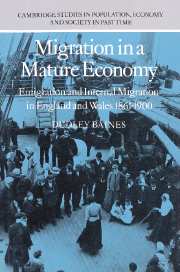Book contents
- Frontmatter
- Contents
- List of tables
- List of figures
- Acknowledgements
- 1 Introduction: the scope of the study
- 2 Issues in the history of European emigration, 1840–1914
- 3 The characteristics of British emigrants before 1914
- 4 The estimation of migration by county of birth
- 5 Return migration to Britain, 1860–1914
- 6 The birthplace of English and Welsh emigrants, 1861–1900
- 7 English and Welsh emigrants in the 1880s and 1890s
- 8 Emigration and urban growth
- 9 Rural-urban stage emigration, 1861–1900
- 10 Wales and the Atlantic economy, 1861–1914
- A summary of conclusions
- Appendices
- Bibliography
- Index
3 - The characteristics of British emigrants before 1914
Published online by Cambridge University Press: 24 November 2009
- Frontmatter
- Contents
- List of tables
- List of figures
- Acknowledgements
- 1 Introduction: the scope of the study
- 2 Issues in the history of European emigration, 1840–1914
- 3 The characteristics of British emigrants before 1914
- 4 The estimation of migration by county of birth
- 5 Return migration to Britain, 1860–1914
- 6 The birthplace of English and Welsh emigrants, 1861–1900
- 7 English and Welsh emigrants in the 1880s and 1890s
- 8 Emigration and urban growth
- 9 Rural-urban stage emigration, 1861–1900
- 10 Wales and the Atlantic economy, 1861–1914
- A summary of conclusions
- Appendices
- Bibliography
- Index
Summary
Britain was one of the most important emigration countries in the late nineteenth and early twentieth centuries. In the period of extensive European emigration up to the First World War, about 10 million or 20% of the emigrants came from Britain. British emigration was a relatively greater proportion of European emigration before 1900, since the very large movements from Italy and eastern Europe only began around that time. Table 2.1 shows that over the period 1851–1913, British emigration rates (i.e. total outflow per decade as a proportion of the mean decade population) were among the highest in Europe. We can also see from Table 2.1 that the large contribution of Britain to total European emigration was not merely a consequence of Britain being one of the very first countries of emigration. British emigration in the 1880s and early 1900s can be compared with the large-scale emigration at that time from other parts of Europe. And,if British emigrants came, in the main, from a few important regions, as they did from most of the other European countries, then some parts of Britain must have experienced rates of emigration that were comparable to those from the important emigration regions of continental Europe.
It is not surprising that the first historians who surveyed the course of British emigration tended to assume that most emigrants left because of rural population pressure, the decline of rural industry and the effects of cheap American grain on rural incomes. The limited quantitative data that had been published made it extremely difficult to estimate the occupational structure and geographical origins of British emigrants.
- Type
- Chapter
- Information
- Migration in a Mature EconomyEmigration and Internal Migration in England and Wales 1861–1900, pp. 45 - 89Publisher: Cambridge University PressPrint publication year: 1986

